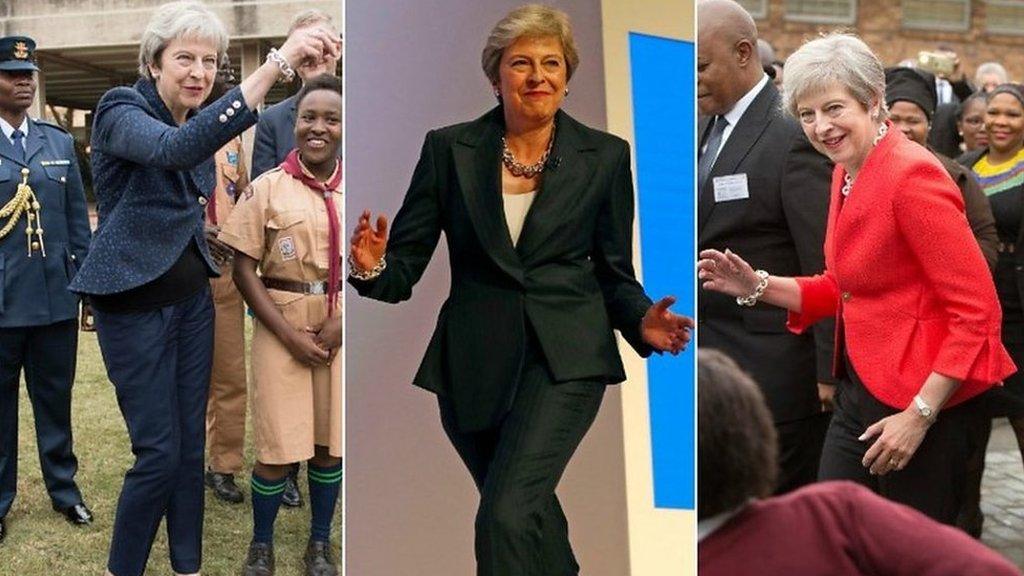Week ahead in Parliament
- Published
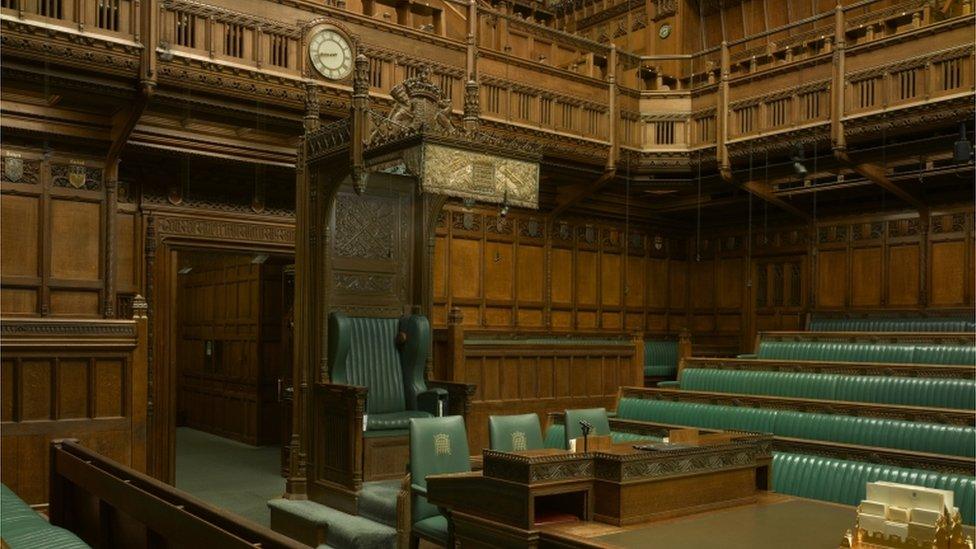
And the big Commons question this week - and indeed for the weeks to come - is "will there be a contested vote of any kind?"
At the moment the whole machinery of government and Parliament is just barely ticking over, waiting for a new prime minister and a new agenda; all substantial legislation is on hold, so the Commons and Lords are mostly dealing with minor technical legislation or backbench and opposition day debates.
In fact, the only reason I can think of for holding a vote on an actual bill is so that people like me can't say there have been no votes.
This could go on for quite some time.
There can't be more Brexit legislation until the new PM announces their Brexit policy.
There can't be any major changes of policy on pretty much anything until a (probably) new chancellor has conducted a Comprehensive Spending Review to find the money for anything big, be it a doubling of the defence budget, a 5p cut in income tax, or a big new initiative on education, housing or social care.
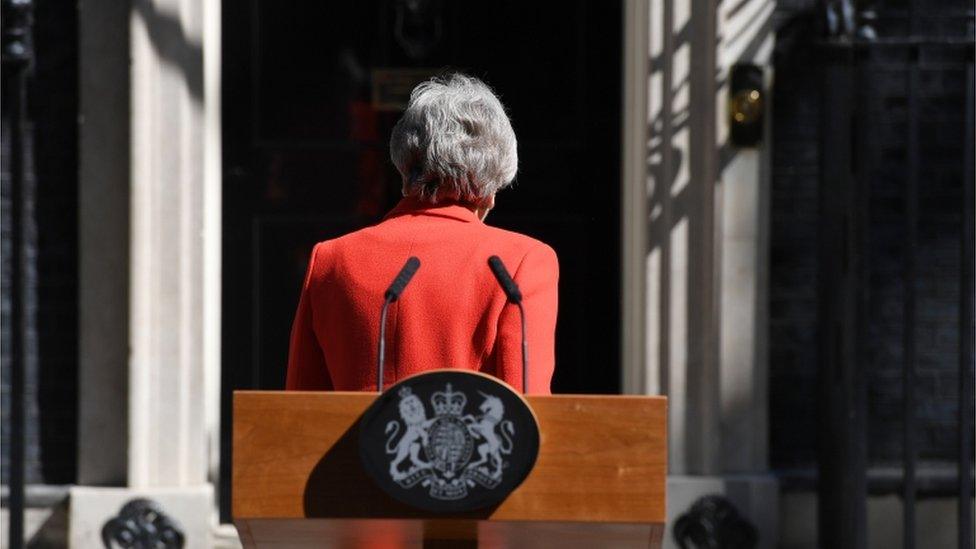
Theresa May is due to step down as prime minister in July
The process of electing a new Conservative leader is expected to produce a new prime minister in July, so the machine may splutter into action, briefly, just before MPs head off for their summer recess.
But don't expect much big-ticket legislation until September at the earliest.
Just about the only new legislation which might catch the eye is a preparatory bill for the 2022 Commonwealth Games in Birmingham, relaxing the Sunday trading laws, as was done for the London Olympics.
This was quite controversial at the time - with the then Chancellor George Osborne hailing an increase in trade, while many unions feared it would usher in a longer-term erosion of workers' rights.
That is not due for debate in the coming week, but the mere prospect of new legislation caused eyebrows to lift.
The select committees may fill the vacuum - watch out for an Environmental Audit Committee report on Export Finance's financing of fossil fuels in developing countries in light of the UK's Clean Growth Strategy, which is due out on Monday 10 June, and for what promises to be a bruising session of the Work and Pensions Committee on "survival sex" - the claim that women on universal credit are being forced into sex work by delays and cuts to their benefits.
Junior minister Will Quince will be batting for the government, having attended a private hearing where the committee took evidence from women engaged in "survival sex".
This covered the impact of universal credit sanctions, levels of payment, delays in payment, deductions, and problems with the digital service.
And while the Department for Work and Pensions has cautioned against making policy based on "anecdote", committee chair Frank Field has retorted that, in the absence of "hard data", "evidence from front-line services... offers a particularly important means" of understanding this issue," but the department's response gives the impression it is unwilling to listen".
You can watch the evidence session live on BBC Parliament on Wednesday at 9:30 BST.
Elsewhere there's election fever..... er, for the vote on a new chair for the Northern Ireland Select Committee, following the return to government of former chair Andrew Murrison.
Nominations close on Monday, and the result will be announced on Wednesday.
Monday 10 June
The Commons opens (14:30) with Home Office Questions, offering Home Secretary - and leadership contender - Sajid Javid a chance to shine.
And in this instance he also has aspiring Lib Dem leader Jo Swinson listed to pose his first topical question.
At 15:30, expect the usual post weekend crop of urgent questions and ministerial statements (the PM didn't make a statement this week, following the recent European Council, so that might be one of them).
Then, Work and Pensions Committee chair Frank Field has a presentation bill on the definition of self-employment.
Somewhere in the middle of all this, I'd expect Lisa Forbes, Labour's new MP for Peterborough, to be introduced to the House.
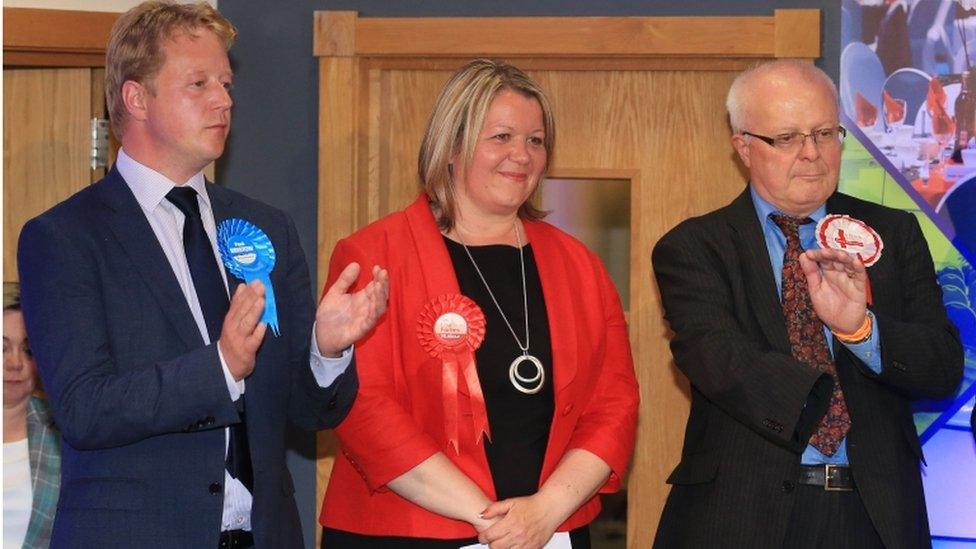
Labour's Lisa Forbes has been elected as the MP for Peterborough
The day's main legislative action is the remaining stages of consideration of the National Insurance Contributions (Termination Awards and Sporting Testimonials) Bill: this is a not particularly controversial piece of technical tidying-up - all Labour is offering in the way of amendments are a couple of clauses requiring the government to publish impact assessments in a year's time.
So it shouldn't be long before MPs move on to a Backbench Business Committee debate, on a motion calling on the government to look at ways to distribute the surplus on the Mineworkers' Pension Scheme to pensioners.
The adjournment debate, led by Lib Dem former cabinet minister Alistair Carmichael, is on UK foreign policy in relation to China and Hong Kong - Mr Carmichael wants to highlight the erosion of democratic freedoms in the former British territory, and in particular the threat of an extradition treaty with China.
In Westminster Hall (16:30) the Petitions Committee has scheduled a debate on e-petition 231602 "NHS supply new lifesaving drugs for cystic fibrosis like 11 other EU countries".
The petitioners argue that children and young adults with cystic fibrosis endure lifelong suffering and early death and that Orkambi and other precision medicines should be made available to them as they are developed, as they are in the EU, the US and Australia. It adds that hundreds have died in the UK in the 3 years since these drugs were licensed. The petition attracted 108,144 signatures.
My committee pick is the Public Accounts Committee (16:00) on funding for Scotland, Wales and Northern Ireland - Treasury permanent secretary, Sir Tom Scholar, and devolved funding director Jean-Christophe Grey, will be quizzed on the ever-sensitive question of how government money is divvied-up between the nations of the UK.
But keep an eye on the Housing, Communities and Local Government session on the Waste Strategy (16:00)- which may sound unpromising but deals with moves to boost recycling which could mean householders end up sorting their rubbish into perhaps five or six separate bins.
In the Lords (14:30) peers ponder the detail of the Courts and Tribunals (Online Procedure) Bill (it is committee stage, so no votes are expected).
Then they debate the National Health Service Commissioning Board and Clinical Commissioning Groups (Responsibilities and Standing Rules) (Amendment) Regulations 2019.
Labour's Baroness Thornton has tabled a motion to regret and will argue that the rate increase that the NHS pays to care homes to cover the costs of services, include an unrealistic "efficiency expectation" of 3.1%, and that this may lead to further shortfalls in social care funding.
Tuesday 11 June
The Commons day begins (11:30) with Business, Energy and Industrial Strategy (BEIS) questions - expect the fate of Ford's Bridgend plant to feature.
The Conservative ex-minister Ed Vaizey has a Ten Minute Rule Bill calling for an Ombudsman investigation into Atomic Energy Authority Pension Transfers.
Look out for another presentation bill from another select committee chair - Labour's Rachel Reeves of the BEIS committee - calling for the UK to commit to zero-net carbon emissions by 2050.
This will be a brief ceremony involving the reading out of the bill title, but no speeches; it is intended to ramp up the pressure on the government to respond to the Committee on Climate Change report which calls for the UK to commit to reaching this goal within 30 years.

MPs will then be asked to approve statutory instruments on consumer rights and child support , before moving on to a general debate on the UK Voluntary National Review on the Sustainable Development Goals.
In Westminster Hall, (9:30) Justine Greening, a former education secretary, and before that economic secretary to the treasury, leads a debate on social mobility and Treasury reform.
She has long argued that the Treasury has never properly valued long-term investment in people, in contrast to the way it regards investment in roads and infrastructure - she will call for a change in attitudes to boost the priority given to education and training, which she believes are essential to the new knowledge economy.
Other debates include Labour's Tanmanjeet Singh Dhesi on imprisonment for public protection (14:30) and Conservative Anne Marie Morris on house building targets (16:30).
She is a member of the Public Accounts Committee which has been looking at concerns about the government's targets and fears that it will not be able to meet housing demand effectively.
On the committee corridor, there's a rare joint meeting of the Science and Technology and Defence committees (9:45) looking at commercial and recreational drone use in the UK, with a series of technical and legal experts.
Meanwhile Sir Lenny Henry is before the Lords Communications Committee (15:30) to talk about public service broadcasting in the age of video on demand.
In the Lords (14:30), after the normal half hour of questions to ministers, peers will pass all stages of the Non-Domestic Rating (Preparation for Digital Services) Bill in a single gulp - this is partly because it is a money bill, and the Lords is forbidden from interfering with it, and partly because it is utterly uncontroversial.
Then come two short debates, on protecting children from harmful vehicle emissions and on the operation of the theatre market and ensuring that theatre is accessible to as wide an audience as possible.
Wednesday 12 July
First business in the Commons (11:30) is Women and Equalities Questions, followed, at 12:00, by Prime Minister's Questions- which will be Theresa May's first PMQs appearance since announcing her decision to resign.
The day's Ten Minute Rule Motion from the SNP's David Linden is on parental leave for people with premature and sick babies - and then Labour have Opposition Day debates on inequality and social mobility, and on discrimination in sport.
In Westminster Hall the subjects for debate include domestic abuse and homelessness (9:30); Vaccination and public health (11:00) and the government response when the closure of last local bank is proposed (14:30)
On the committee corridor there's that Work and Pensions Committee evidence session on universal credit and "survival sex" (9:30 - live on BBC Parliament) and a Women and Equalities Committee hearing (9:50) on the mental health of men and boys, with witnesses from the UK Council for Psychotherapy, the Samaritans, the Centre for Mental Health, and the British Medical Association.
In the Lords (15:00) after their usual half hour of questions to ministers, peers deal with a couple of Private Members' Bills first the third reading of the Lib Dem Lord Dholakia's Age of Criminal Responsibility Bill - this aims to take 10 and 11 year-olds who commit serious offences out of the Criminal Justice system, in favour of a "welfare-based approach" in secure care if necessary.
At the moment children in this age range who commit a "grave crime", including burglary and serious violent and sexual crimes, are tried in the adult Crown Court.
While the bill looks set to complete its Lords consideration, it will face the usual fate of Lords Private Members' Bills in the Commons - which is to be added to a long queue of legislation which is never debated.
Next will come the committee stage consideration of the Holocaust (Return of Cultural Objects) (Amendment) Bill - a Private Members' Bill from the Commons, which removes a "sunset clause" on legislation to allow museums and cultural institutions to return artworks looted by the Nazis to their rightful owners.
The bill was piloted through the Commons by the Conservative Theresa Villiers and through the Lords by Lord Sherbourne of Didsbury.
Then peers debate two reports from their Constitution Committee on 'The Legislative Process: Preparing Legislation for Parliament'; and on 'The Legislative Process: The Delegation of Powers' and a report from their Communications Committee 'Regulating in a Digital World'.
Thursday 13 June
Transport Questions open proceedings in the Commons (9:30) followed by the weekly Business Statement from the Leader of the House, Mel Stride.
The main debates are on subjects chosen by the Backbench Business Committee - social housing and making Parliament a more modern, family friendly and accessible workplace.
In Westminster Hall (13:30) there will be a debate on the Housing, Communities and Local Government Committee report on high streets and town centres in 2030.
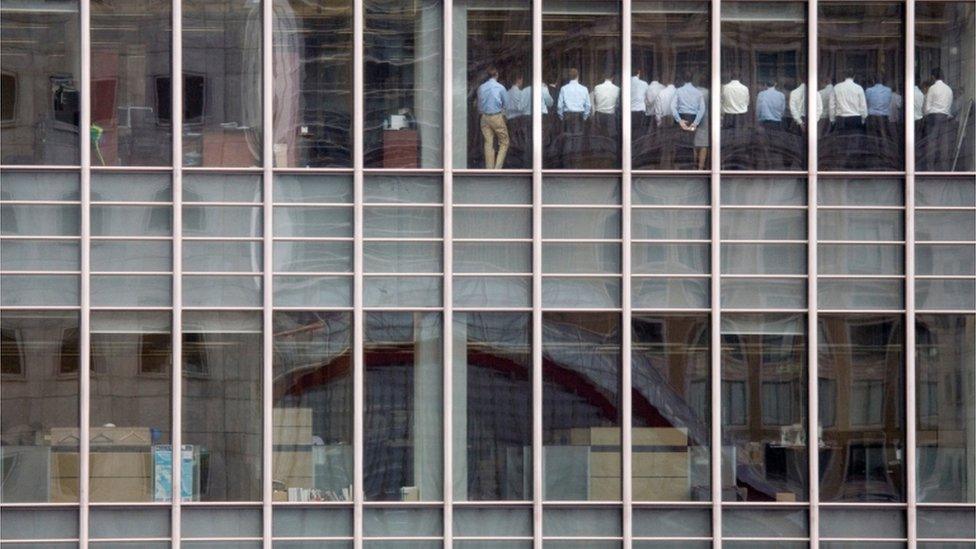
Bankers attending an emergency meeting at the London office of Lehman Brothers, during the financial crisis
In the Lords (11:00) the main debates are on subjects chosen by backbench Labour peers - first Lord Dubs on inequalities in income, wealth and living standards in the United Kingdom since the 2008 financial crisis; and then Lord Foulkes on free public transport and television licences for the elderly.
He will be highlighting how they can help combat the growing scourge of loneliness among older people, but also urging ministers not to set poor older people against poorer young families in the cause if inter-generational fairness and leave the rich with their growing wealth untouched.
In between there will be a 90-minute mini-debate in the impact of the increased use of referenda on representative democracy, led by Labour's Lord Soley.
Friday 14 June
The Commons will not be sitting, but peers will be - the Lords meets at 10:00 to consider Private Members' bills - starting with the second reading of Baroness Finlay of Llandaff's Access to Palliative Care Bill.
Baroness Finlay is a professor of palliative medicine at Cardiff University School of Medicine, and is consultant at the Velindre Cancer Centre in Cardiff.
Her bill seeks to address the current wide geographical variations in the availability of this care in England, by legislating to require that all Clinical Commissioning Groups (CCGs) ensure that high quality, specialist palliative care services are available to those who need them.
She argues that this is an urgent healthcare issue, give recent projections that palliative care needs will rise by 42% in the next 25 years.
And with growing numbers of British people living with a chronic diseases near the end of their life, palliative care becomes more complex and requires more specialisation.
This is Baroness Finlay's second attempt to legislate on this issue; an earlier version of this bill failed to attract government support in 2015, but she believes as stories of bad care continue to emerge, ministers will need to embrace her proposals, or something like them.
- Published18 July 2019
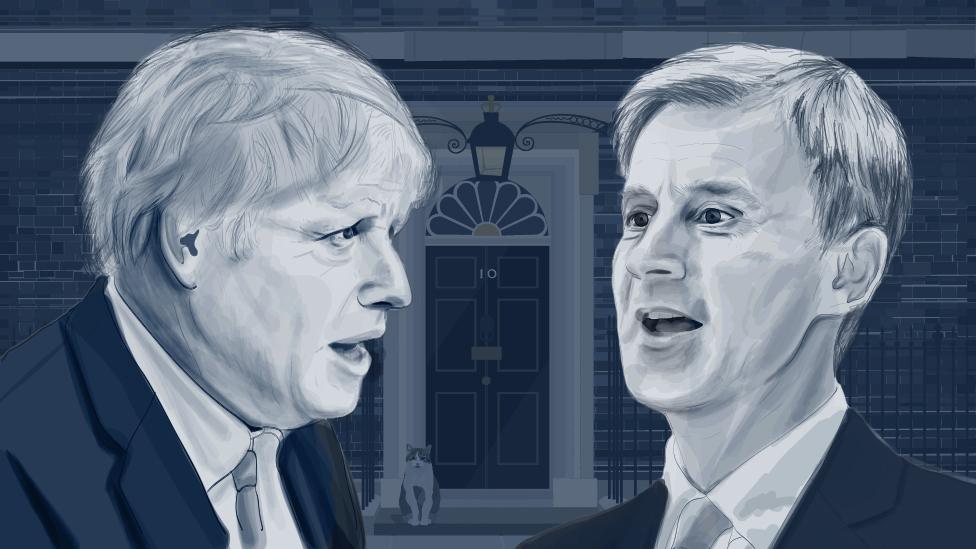
- Published3 September 2019
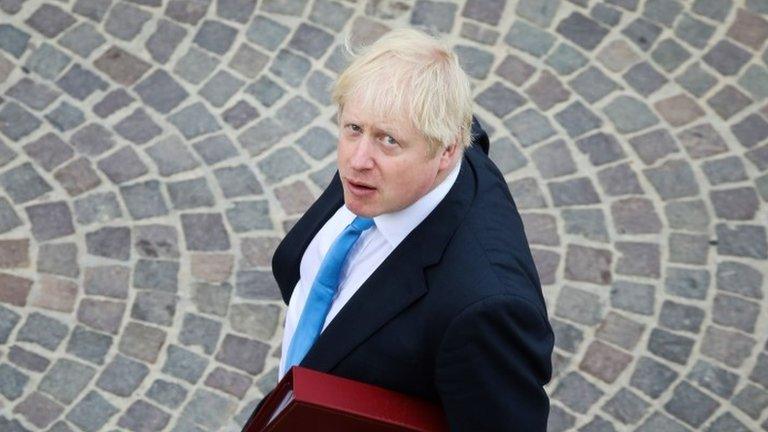
- Published7 June 2019
